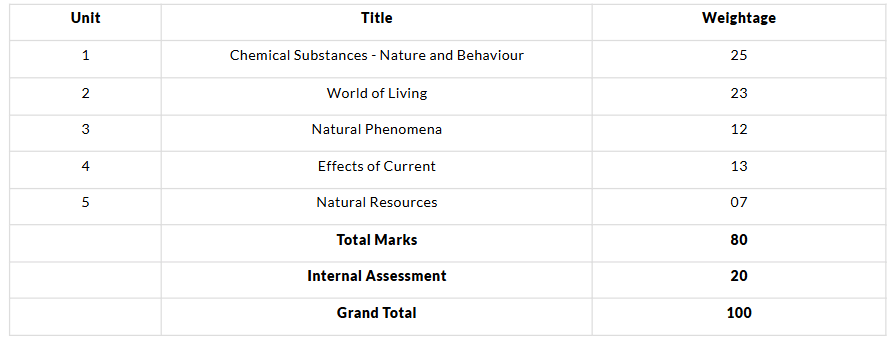How to prepare for Class 10: Tips & Tricks for Science | Science Class 10 PDF Download
Science exam for Class 10 by the CBSE aims at making students aware of all the topics and basic concepts in all three areas namely chemistry, physics, and biology, and test them on these areas. We all know that Science plays an important role in life and therefore, its study is quite crucial for all of us. 
Science Class 10 - Includes 185 docs, 174 videos & 106 tests
One needs to focus on all concepts while preparing for Class 10 Science. With some really good study material and complete focus, you can perform very well in your exam.
Here are a few tips to guide you in the right direction with the preparation:
1. Make a proper timetable and start with the basics:
The first step in your preparation should be to build a strategy make a schedule and follow it strictly. Give a good amount of time to all subjects so that you do not miss out on any topic. Your time is precious, use it judiciously. Make sure to strengthen your basics initially by studying from the NCERT Textbooks. Study additional books only after you know that your basic concepts are clear
NCERT Textbooks and Solutions:
Chapter 1 - Chemical Reactions and Equations
- NCERT Textbook Chapter 1 - Chemical Reactions & Equations
- NCERT Solutions - Chemical Reactions & Equations,
Chapter 2 - Acids, Bases and Salts
Chapter 3 - Metals and Non-metals
Chapter 4 - Carbon and its compounds
Chapter 5 - Life Processes
Chapter 6 - Control and Coordination
Chapter 7 - How do Organisms Reproduce?
Chapter 8 - Heredity
Chapter 9 - Ray Optics - Light : Reflection and Refraction
- NCERT Textbook Chapter 9 - Light - Reflection and Refraction
- NCERT Solutions, Ray Optics:- Light, Reflection and Refraction
Chapter 10 - Ray Optics - The Human Eye and Colorful World
- NCERT Textbook Chapter 10 - The Human Eye and the Colourful World
- NCERT Solutions, Ray Optics- The Human Eye And The Colorful Word
Chapter 11 - Electricity
Chapter 12 - Magnetic Effects of Current
- NCERT Textbook Chapter 12 - Magnetic Effects of Electric Current
- NCERT Solutions, Magnetic Effect on Electric Current
Chapter 13 - Our Environment
2. Learn formulae and Important topics:
All the formula included in the Class 10 science syllabus should be on your tips so that during the exam , you don't have to waste any time remembering them. The exam contains direct formulae and theorem-based questions. Hence, revise them thoroughly to solve questions accurately. Also, do study the important topics mentioned with utmost concentration. After you study a chapter, make a habit of noting down some important points and formulae. This will help in remembering the concepts.
3. Solve Previous Years Papers:
Practice is really important as you will be able to retain various topics in your mind for a long time. Previous Year question papers are a must to solve as they will help you understand the pattern of the exam. Also, you will be able to know your strengths and weaknesses. Time yourself while you attempt them in examination hall conditions. After trying every paper, evaluate yourself. This practice will help you gain self-confidence, which is one of the most important things to have during the exams.
Practice Tests:
- Chemical Equations - Chemical Reactions & Equations, Class 10 Science
- Introduction To Acids And Bases - Acids, Bases And Salts, Class 10 Science
- Physical Properties Of Metals And Non Meatals - Metals And Non Meatals, Class 10 Scince
- Covalent Bonding Of Non Metals - Carbon & Its Compounds, Class 10 Science
- Nutrition In Plants - Life Processes, Class 10 Science
- Central Nervous System In Humans - Control And Coordination, Class 10 Science
- Reproductive System In Humans - How Do Organisms Reproduce?, Class 10 Science
- Heredity And Variation - Heredity And Evolution, Class 10 Science
- Reflection Of Light - Light : Reflection And Refraction, Class 10 Science
- Human Eye - The Human Eye And The Colourful Word, Class 10 Science
- Current And Voltage - Electricity, Class 10 Science
- Magnetic Field - Magnetic Effects Of Electric Current, Class 10 Science
- Our Environment - MCQ Test , Class 10 Science
CBSE Class 10 Science Exam Paper Pattern:
In the new scheme of examination, CCE and the term system have been replaced with a single annual exam by CBSE.
The exam will be conducted by CBSE for 80 marks, and 20 marks are for internal assessment at school. CBSE has issued detailed guidelines on how the internal marks will be divided among different activities.

Weightage of Chapters for Class 10 Science:
Below is the official blueprint of CBSE Class 10 Science:
Important Topics For class 10 Science:
Chemical Reactions and Equations:
1. Chemical equations (Writing and balancing).
2. Different types of chemical reactions.
Acids, Bases and Salts:
1. Reactions of acids and bases.
2. Reaction of oxides with acids and bases.
3. Different types of salts.
Metals and Non-metals:
1. Chemical properties of metals (special reference to reactions with air and water).
2. Properties of ionic compounds.
3. Extraction of metals based on the activity series.
Carbon and its Compounds:
1. Different allotropes of carbon (only SA questions).
2. Nomenclature of organic compounds.
3. Addition reaction and substitution reaction.
4. Properties of ethanol and ethanoic acid.
5. Formation of soaps and detergents.
Life Processes:
1. Mode of nutrition (with special reference to autotrophic nutrition).
2. Human digestive system.
3. Human respiratory system.
4. Function of human heart.
5. Formation of urine.
Control and Coordination:
1. Reflex action.
2. Function of human brain.
3. Hormones in animals.
How Do Organisms Reproduce?
1. Differences between various modes of asexual reproduction.
2. Double fertilisation.
3. Male reproductive system.
4. Fertilisation in females.
Heredity
1. Mendel’s Laws.
2. Sex Determination
Light: Reflection and Refraction:
1. Image formation by spherical mirrors due to reflection.
2. Image formation by spherical lens due to refraction.
3. Sign convention for reflection by spherical mirrors and for refraction by spherical lens.
4. Mirror and lens formula along with magnification for both the cases.
The Human Eye and the Colourful World:
1. The parts and working of a human eye.
2. Power of accommodation for human eye.
3. Defects of human eye along with their corrective measures.
4. Dispersion of white light passing through the triangular prism.
5. Atmospheric refraction and scattering.
6. Tyndall effect.
Electricity:
1. Ohm’s law.
2. Resistance, factors on which it depends, resistivity.
3. Effective resistance of the resistors connected in series and parallel combination.
4. Joule’s law of heating and electric power.
Magnetic Effects of Electric Current:
1. Magnetic field due to various current carrying conductors.
2. Right hand thumb rule and left hand rule.
3. Magnetic force due to current-carrying conductors and electric motor.
4. Domestic electric circuits.
Our Environment:
1. Significance of food chain and food web.
2. Energy flow (10%).
Preparation tips for Physics, Chemistry and Biology:
(a) Physics:
- Understand the sign conventions and rules for drawing ray diagrams.
- Note down the important formulae and equations.
- Practice the numerical questions and revise the concepts on a regular basis.
- Speed with accuracy in solving problems can only be acquired through in-depth study of the subject and extensive practice.
(b) Chemistry:
- Practice the balancing of chemical equations.
- Questions on modern periodic table and reactivity series cannot be missed. So study the Periodic Classification chapter really well.
- Study the preparation of different types of salts.
- pH-related questions may be optional based.
- Questions on alloys and corrosion will be part of practical based questions.
(c) Biology:
- Practice the diagrams (to name a few: asexual reproduction, male and female reproductive systems, human heart, human excretory system, double circulation).
- Solve the Mendel’s heredity crosses with stress on the laws of Mendel (3 marks).
- Remember the concepts on ‘Food Chain’, ‘Significance of Food Chain’, ‘10% Law’, ‘Evolution of Cabbage’, ‘Water Harvesting Technique’ and ‘Different stakeholders’.
- Long answer questions on ‘Life Processes’ (any human system should not be missed out).
Similarly, Prepare For Other Subjects Of Class 10:
Link to How to prepare for SST History for Class 10?
Link to How to prepare for SST Geography for Class 10?
Link to How to prepare for English for Class 10?
Link to How to prepare for SST Economics for Class 10?
Link to How to prepare for Hindi for Class 10?
Link to How to prepare for SST Civics for Class 10?
Link to How to prepare for Mathematics for Class 10?
Social Science (SST) Class 10 (Videos | Docs | MCQs)
Includes 240 docs, 119 videos & 56 tests
English for Class 10 (Videos | Docs)
Includes 277 docs, 28 videos & 5 tests
Mathematics Class 10 - Videos, Docs, MCQs
Includes 118 docs, 156 videos & 78 tests
Hindi for Class 10 (Videos | Docs)
Includes 190 docs & 40 videos
Olympiad Preparation for Class 10
Includes 39 tests
Crash Course for Class 10 Maths by Let's tute
Includes 31 docs & 84 videos
Class 10 Mathematics by Full Circle
Includes 125 docs
Social Science (SST) Class 10 - Model Test Papers in Hindi
Includes 60 docs
Social Science (SST) Class 10 - Model Test Papers
Includes 60 docs
English Communicative (Interact In English) For Class 10
Includes 38 docs
Information & Computer Technology (Class 10) - Notes & Video
Includes 20 docs & 6 tests
|
80 videos|569 docs|80 tests
|
FAQs on How to prepare for Class 10: Tips & Tricks for Science - Science Class 10
| 1. How can I effectively use NCERT textbooks for Class 10 Science preparation? |  |
| 2. What are some important topics to focus on for Class 10 Science exams? |  |
| 3. How can I create an effective study schedule for Science in Class 10? |  |
| 4. What are some tips for solving numerical problems in Class 10 Science? |  |
| 5. How can I boost my confidence before the Class 10 Science exam? |  |




























